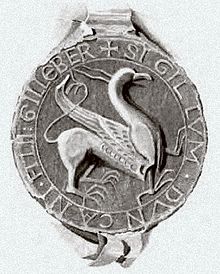| Donnchadh (Duncan) | |
|---|---|
| Mormaer or Earl of Carrick | |
 | |
| Reign | c. 1186–1250 |
| Predecessor | Gille-Brighde mac Fergusa |
| Successor | Niall mac Donnchaidh |
| Born | mid-to-late 12th century location unknown, probably Galloway or Carrick |
| Died | 13 June 1250 unknown |
| Burial | unknown |
| Spouse | Avelina, daughter of Alan fitz Walter |
| Modern Gaelic | Donnchadh mac Ghille-Brìghde |
| Latin | Don[n]ecanus or Dun[e]canus filius Gilleberti |
| Norman French | Dunecan fitz Gilbert |
| Father | Gille-Brighde of Galloway |
| Mother | uncertain, but perhaps a daughter or sister of Donnchadh II, Earl of Fife |
Donnchadh (Scottish Gaelic pronunciation: [ˈt̪ɔn̪ˠɔxəɣ]; Latin: Duncanus; English: Duncan) was a Gall-Gaidhil prince and Scottish magnate in what is now south-western Scotland, whose career stretched from the last quarter of the 12th century until his death in 1250. His father, Gille-Brighde of Galloway, and his uncle, Uhtred of Galloway, were the two rival sons of Fergus, Prince or Lord of Galloway. As a result of Gille-Brighde's conflict with Uhtred and the Scottish monarch William the Lion, Donnchadh became a hostage of King Henry II of England. He probably remained in England for almost a decade before returning north on the death of his father. Although denied succession to all the lands of Galloway, he was granted lordship over Carrick in the north.
Allied to John de Courcy, Donnchadh fought battles in Ireland and acquired land there that he subsequently lost. A patron of religious houses, particularly Melrose Abbey and North Berwick priory nunnery, he attempted to establish a monastery in his own territory, at Crossraguel. He married the daughter of Alan fitz Walter, a leading member of the family later known as the House of Stewart—future monarchs of Scotland and England. Donnchadh was the first mormaer or earl of Carrick, a region he ruled for more than six decades, making him one of the longest serving magnates in medieval Scotland. His descendants include the Bruce and Stewart Kings of Scotland, and probably the Campbell Dukes of Argyll.
- ^ Laing, Descriptive Catalogue, p. 33